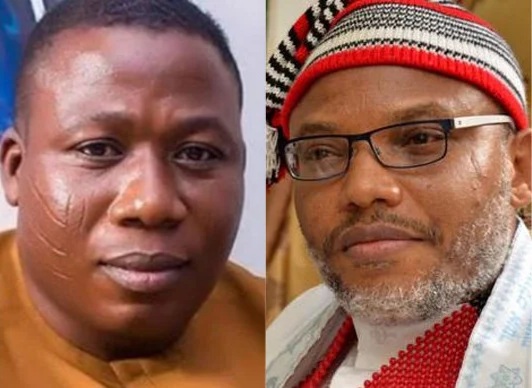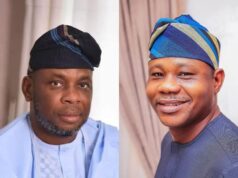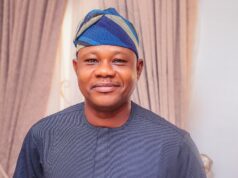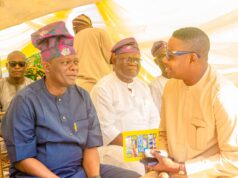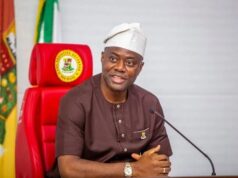
The claim that Kenya was where Nnamdi Kanu, leader of the Indigenous People of Biafra, (IPOB) was arrested and extradited to Nigeria had better not be true. Kenya? While Nigeria has stubbornly but ostensibly hidden the identity of its accomplice nation in the crude and gangsterish abduction saga, the United Kingdom, whose nationality Kanu holds, through Dean Hurlock, Head of Communications at the British High Commission in Nigeria, swiftly denied that the event took place on its soil.
Kenya’s High Commissioner, Wilfred Machage, attempted to go the UK route by disclaiming the country’s involvement in the messy saga. Kanu’s brother, Emmanuel, however put a lie to the Kenyan government’s claim. “Whilst visiting Kenya, Nnamdi Kanu was detained and handed over to the Nigerian authorities who then flew him to Nigeria,” he had said matter-of-factly. Kenya’s Director General of Immigration Services, Alexander Muteshi, further problematized the mess. Dismissing claims of Kenya’s complicity, he hinted that Kanu might probably have entered the country illegally. “I can’t know that,” Muteshi was quoted to have said by the Kenyan Nation newspaper, maintaining that, “I am not in the picture of his presence in the country. I am only able to tell if somebody entered the country legally.” Did Kenya use Kanu’s incognito entry into Kenya as alibi to trade him to his assailants?
Kenyan chapter of the Human Rights Watch (HRW) also pointed at the Kenyan authorities’ penchant for flagrant violation of asylum seekers’ international rights on the soil of Kenya and aiding their illegal deportation in circumstances that were dangerous and life-threatening. “Kenyan authorities have a responsibility for what happens within their borders, and should investigate the possibility of complicity of its officials in this flagrant disregard for due process,” Otsieno Namwaya, HRW’s East African Director said.
If indeed Kenya, a country which got its independence from Britain on December 12, 1963, due mainly to the revolutionary activities of Kimathi wa Waciuri, better known as Dedan Kimathi Waciuri, could offer to betray another ‘freedom fighter’ on an African soil, then it is rekindling an old betrayal narrative which began 63 years ago. After Kimathi, Kenya’s notoriety for playing Judas has deepened tremendously. It is notorious for disregarding international law on extradition, clandestinely betraying harangued persons who run to its land for safety.
While the Kenyan government denied complicity, as it is doing in the present Kanu case, attention riveted on it as where nephew of Fethullah Gulen, exiled Turkey cleric, Selahaddin was abducted and parceled to Turkey, in cahoots with Turkey’s National Intelligence Organisation (MIT). Accused of belonging to an outlawed organization like Kanu’s IPOB, while Kenya denied being in cahoots with Turkey for the dastardly act, Selahaddin’s wife, Serriye, a teacher in Kenya, said confidently that her husband, a Kenyan registered asylum seeker, who also held a permanent US residency, suddenly went missing on the streets of Nairobi on May 31, 2021, only to appear in handcuffs in Turkey.
Kimathi was one of the few brave Africans who dared to look the colonialists in the eyes, who led an armed struggle against the colonialists in the 1950s. He just couldn’t stomach Britain’s colonial yokes on the shoulders of his Kikuyu people. In standing against Britain, Kimathi became a precursor of the angst and anger of a Kanu who also could not stand the long decades of injustice against his Igbo people. Perpetrated by a combine of Hausa/Fulani and pliable minions in other parts of the country, the mantra of “no victor, no vanquished” after the Nigerian civil war was obviously a lame shibboleth aimed at hoodwinking unsuspecting fools.
Kimathi was labeled terrorist by the British colonial government. He joined and later led the Mau Mau movement, a ferociously militant Kikuyu, Embu and Meru army which initially began as the Land and Freedom Army (KLFA). KLFA’s mission was to reclaim lands which British settlers had appropriated from indigenes without compensation. Like Kanu, from the moment his rebellion became public knowledge, an obsessive hunt was made to bring him to book. He however fled into the forest.
With a bounty of 500 pounds placed on his head, just like the N100 million placed on Kanu’s head, Kimathi lived in the forest for almost four years. However, on October 21, 1956, a British colonial officer, lan Henderson, assisted by intelligence gathered from ex-Mau Mau fighters, tracked Kimathi to his hideout in the Tehu forest, shot him in the leg and was eventually captured by Ndirangu Mau, a fellow Kenyan-born askari who fought on the side of Britain.
Just as the Muhammadu Buhari government celebrates the capture of Kanu like a titivated little urchin, so did Britain do to Kimathi. Armed with the picture of a hitherto invincible Kimathi now lying prostrate on a stretcher without cloth on, his heavily dreadlocked head packed like a wig, Britain mass-circulated leaflets of this picture, numbering over 120,000 copies, so as to demoralize fighters in the Mau Mau war. As Britain went tipsy with joy, Kikuyu people were sad and livid.
Kimathi was subsequently charged with possession of a .38 assault gun and a court of an all-black jury of Kenyans, presided over by Justice O’Connor, sentenced him to death. He was subsequently hanged in the early hours of February 18, 1957 at the Kamiti Maximum Security Prison, aged 37.
Kimathi was buried in an unmarked grave concealed for 62 years thereafter, until October 25, 2019. His last word to his wife, Mukami, was, “I have no doubt in my mind that the British are determined to execute me. I have committed no crime. My only crime is that I am a Kenyan revolutionary who led a liberation army… Now If I must leave you and my family I have nothing to regret about. My blood will water the tree of Independence.”
In 1999, Nairobi similarly delivered then 50-year old Abdullah Ocalan, Kurdish political prisoner, who founded the militant Kurdistan Workers Party, (PKK) to the Turkish National Intelligence Agency (MIT). Turkey soon sentenced him to death.
So, as it did to Kimathi, Ocalan and Selahaddin Gulen, Kenya has again parceled Kanu to the Nigerian lions. Separated by decades in time, personalities involved and the climes of their operations, Kimathi and Kanu were bonded by what they believed was the struggle for their people. But there is the character flaw of their being arbitrary in dealing with the same people they claim they protect.
While Kanu unconscionably reeled out filthy curses and gutter gruff, history says Kimathi crudely beat his people while wielding his notorious double-barreled shotgun. Initially misled into believing that his stay-at-home order in Igboland in May, 2021 failed in Enugu, Kanu had raved and cursed ndi Enugu, saying he was not surprised at their sissy action as many Enugu sons and daughters, according to him, were sired by accursed Hausa soldiers during the civil war! Kimathi too, renowned for his crudity, compelled Kikuyu fighters to swear to oath of allegiance and solidarity to his movement. You broke the oath to your sorrow.
Most likely because of the international implications of incriminating Kenya again, judging by its ignoble pedigree as a land of serial betrayals, the Buhari government has kept sealed lips on the identity of the African nation that played Judas in the Kanu roulette. Nor does it want to go into details of the gangster operation that landed the Biafran struggle activist on Nigerian soil. Doing so would have typecast, as a familiar route, Buhari’s impatience with civility.
Kanu’s abduction is apparently a successful rehashing of a failed old script. On a summer day in London, 1984, Buhari’s military regime had perfected same method. In dalliance with an alleged Israeli former Mossad agent, Alexander Barak, a plot to kidnap and repatriate exiled Shehu Shagari’s Minister of Transport, Umaru Dikko from his Bayswater home.
The despotic military government had accused Dikko of embezzling £625m of Nigerian money. Abducted, drugged and handcuffed by Major Mohammed Yusufu, a Nigerian intelligence officer and two Israelis, Felix Abitbol and Dr Lev-Arie Shapiro, Dikko was crated in a transit van and taken to the Stansted cargo airport as a cargo designated to be a Diplomatic Bag that immune from search. At Stansted, Dikko’s abductors awaited a Nigerian Airways plane to ferry the now unconscious ex-minister back to Nigeria. The abduction was however foiled by a young customs officer named Charles David Morrow who was spurred into action by an alarm raised by Dikko’s secretary who had witnessed from the window panes the Bayswater kidnap. While UK jailed the three Israelis, world’s attention riveted on Nigeria’s military authorities as infernally despotic, necessitating breaking of diplomatic relations between Nigeria and the UK.
Though there are no accounts of a deep relationship between him and any Igbo since after the civil war, archivists reference Buhari’s 2003 and 2007 presidential election dalliance with Chuba Okadigbo and Ume Ezeoke, both of whom hailed from Oyi and Nnewi in Anambra state respectively, as his hands of fellowship across the Niger. Buhari has however never hidden his disdain for the Igbo – the five percent people. From his venal vituperations against them since he became president in 2015 to the scant appointments he gave them, it may not be very difficult to see how he rates these people.
By extraditing Kanu, most likely the Umaru Dikko-way, Buhari not only went into his Mengistu Haile Mariam pouch to bring out an old trick he deployed in 1984. His legmen have been rationalizing it on the social media, citing despotic Paul Kagame’s cavalier acknowledgment on a live Rwanda state television call-in programme that his government lured home from Dubai his major critic, Paul Rusesabagina, insinuating that it was a “flawless” operation. Rusesabagina’s sin, like Kanu’s, was his headship of the opposition Rwanda Movement for Democratic Change, a coalition group with an armed wing called the National Liberation Front, which Kagame, a notorious despot, has variously accused of attacking Rwanda.
Kagame had said, “There was no kidnap. He got here on the basis of what he believed and wanted to do. It was actually flawless. It’s like if you fed somebody with a false story that fits well in his narrative of what he wants to be and he follows it and then finds himself in a place like that.”
In another interview being circulated, Kagame had asked his interviewer what was wrong in interdicting an outlaw and bringing him to face the law at home. Rusesabagina attracted the kudos of the world through the narrative of how he saved 1,268 Rwandans during the 1994 genocide. For this bravery, he was given a Presidential Medal of Freedom by President George W. Bush in 2005. After living in Rwanda two years after the genocide, he escaped to Tanzania with the help of the Rwanda Patriotic Front and in 1996, applied for asylum in Belgium and migrated to Brussels with his family. His claim was that his life was being threatened. Not long after, he thereafter moved over to San Antonio, Texas. Arriving Dubai on a flight from Chicago, like Kanu, Rusesabagina suddenly vamoosed shortly after his arrival in the UAE and appeared a few days later in Kigali, manacled and now being charged for terrorism, arson and murder. But, how come Buhari’s lickspittles who crave Kagame’s despotism don’t seek to clone his developmental revolution in Rwanda?
We are yet to see the Buhari fawners cite the Belarus example as justification for his government’s interception of Kanu. Belarus’ authoritarian president, Alexander Lukashenko, had personally ordered an MiG-29 fighter jet to accompany a Ryanair plane that had opposition leader Raman Pratasevich on board as he traveled from Athens, Greece, to Vilnius, Lithuania to the Minsk airport. Claiming that there was a bomb threat on the plane, Lukashenko, in what was seen as a hijacking operation by government, upon landing, had Pratasevich arrested at the airport. Pratasevich had fled to Poland and set up the Telegram messaging app called Nexta channel, with which major protests against Lukashenko was organized.
I am not Igbo and so have nothing to do and gain in Kanu’s Biafra ideology. Igboho’s ways are not mine too. But when your neighbour repeatedly inserts his forefinger into your mouth, you dig your teeth into it. Khalifa Nasir el-Rufai was on a BBC interview last week. He said of Kanu’s travails and why Boko Haram and bandits won’t get his treatment: “I was very happy (at the arrest) because, first he jumped bail, jeopardising his sureties… challenges the sovereignty and the authority of a state and incites violence; he refers to his own country as a zoo. This should be a message to all these separatists challenging the authority of the Nigerian State to be very careful.”
In El-Rufai’s pint-sized logic, IPOB was more dangerous to Nigeria than Boko Haram. “People are comparing apples to oranges. Nnamdi Kanu is the leader of IPOB, a proscribed organisation… Shekau was in hiding and for the past 10 years and the military had been waging a war to get him. It is not like Shekau was in Saudi Arabia, sitting in one place, tweeting about the breakup of Nigeria or asking Boko Haram to go and kill Helen and Nasir el-Rufai… Regarding bandits, they are not centralised under one leadership. Who is the head of the bandits? Who is the equivalent of Nnamdi Kanu with banditry? Bandits are just collections of independent criminals. It is a business for them. It is not a case of Nigeria must break up.” Imagine! It is that same skewed, obtuse logic that has made Buhari to concentrate a hyper energy at mowing down a criminal organization that has, comparatively killed about 60 people while he begs blood-thirsty terrorists who have murdered thousands of Nigerians, including soldiers.
The Nigerian government was introducing a new lexicon to the grammar of international outlawry when Lai Mohammed, its Minister of Information, claimed that Kanu had been “intercepted.” What does it mean to be intercepted? By the rendering of lexicography, it must mean being disrupted from the normal channel of one’s flow. So, was Kanu disrupted from his flow by the Nigerian government? Mohammed even introduced a very porous and vain logic to the address, seeking empathy to the government’s vacuous course by seeking to implicate Kanu’s sartorial worth in his outlawry. Who asks Lai Mohammed the origin and worth of his agbada, apparently financed by Nigerians’ money? What does reference to Kanu’s sartorial makeup hope to achieve?
Bearing every imprimatur of extraordinary rendition, a grievous crime in international relations with huge diplomatic implications, both Nigeria and Kenya cannot be allowed to go scot free in this bilateral roguish abduction. There are existing structures of international diplomacy which sane countries of the world adopt to extradite fugitives. Twice under Buhari, violence and gruff have been deployed as answer to deporting fugitives.
The international community must stop the Nigerian state from its continued embarrassment to the international system. Kanu fled from Nigeria when, upon being granted bail by a competent Nigerian court, soldiers stormed his father’s house and killed people in the process. Only a mummy would wait for the soldiers to make a corpse of him. He fled for his life and in the process, became a fugitive.
Nigeria cannot thus make itself impervious to questionability, a trend that most states of the world, including advanced democracies, are being subjected to. Citizens have to question and interrogate the state. When citizens thus interrogate the state as Kanu did crudely, there are often two answers from runners of the state, either dialogue with them or deploy force in what is called a just war which has to be fought according to rules of international relations. Since the days of the Italian theorist, Antonio Gramsci, states have ceased to use coercion as answers to interrogation by its citizens. When you deploy force, you escalate existing problem. The history of separatist agitations and insurgency, as shown by Boko Haram founder, Mohammed Yusuff, shows that the problems always fester. Buhari has shown that he is not a reconciliatory leader but one fascinated by manacles and the hubris of violence as recompense for infractions.
Nigeria’s latest disregard for international law is not about Kanu. It is about the sanity and sanctity of rules of law. Those who know have insinuated that upon being brought to court, Kanu looked drugged, wry and vacant, pointing at the possibility of violence having been administered on him while being captured and crated to Nigeria. I personally cannot stand Kanu’s incivility but a despot who confessed to have morphed into a democrat cannot be allowed to swivel back into his vomit without sanction.
One of the after-effects of Buhari’s deployment of gruff on the southeast and harangue of Sunday Igboho in the west, rather than dialoguing with the people, is that he is aggravating the problem of his perception as a hater of anyone not of his region and religion. While he is sending his agents to ransack, kill and violate Igboho’s Ibadan house, soldiers are killing Igbo in the east, on one side.
On the other side, bandits who kill hundreds in the Northwest are busy taking selfies with governors and Buhari’s anointed amicus curiae, Sheik Gumi. On this other side, Buhari mollycoddled Abubakar Shekau for years, until he was killed by ISWAP. Buhari does not dialogue with anyone questioning the Nigerian state from the south. He is nevertheless not averse to discussing with bandits. These two, Janus faces of Buhari give a typecast that he is creating an amoral and self-centered leadership. He is also building a mob anthill which will ensure that the disenchanted people of the west and those in the east would ultimately0 forge a common front of rebellion against him and the Nigerian state.
As Buhari is embroiled in all these, I want to remind him that if a petulant and impatient child angrily slaps the sword-leaf that the Yoruba call labelabe, he will provoke a gush of blood. Buhari is provoking a gush of blood with his recalcitrant fixation on routing southern rebels and leaving out northern malefactors. Abacha did worse than him in slapping the labelabe multiple times but today, the goggled despot occupies the debris of world history.
Invariably, Buhari should help himself and help all of us to have peace by promoting peace. His violence for violence policy can only metastasize the cancer of violence. Neither Kanu nor Igboho represents what we should or have always had as leaders. They are too limited mentally to be our prototype of leaders. Regrettably, both are busy filling the gullies dug in the south by Buhari’s erosion of quality leadership and his unjust promotion of his Fulani people at the expense of merit. If IPOB members were ten before Buhari’s obstinate fixation on militarily dissembling Biafran advocates, today, on account of his stiff-neckedness, IPOB believers must have risen to fifty, escalated by Buhari’s unjust policies. Dialogue would have deflated their ranks to two. Time to de-escalate tension is now.


